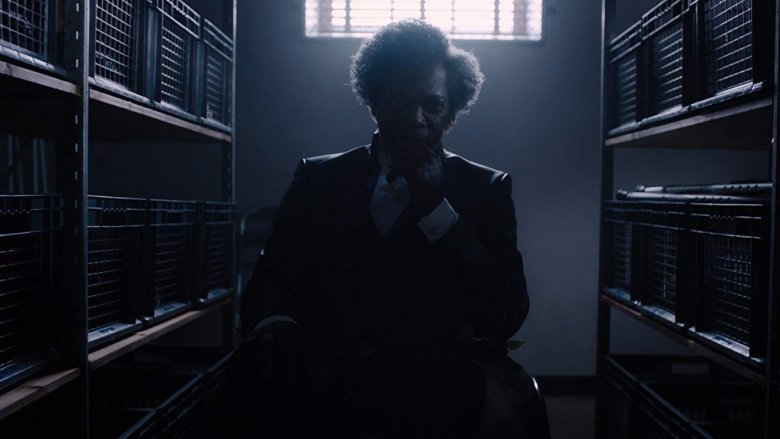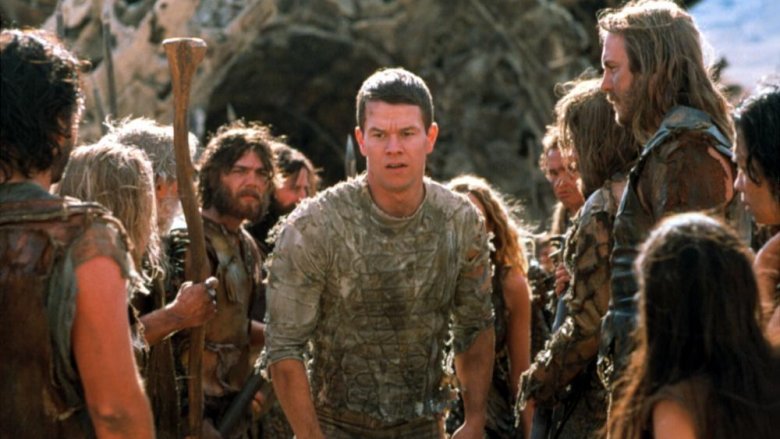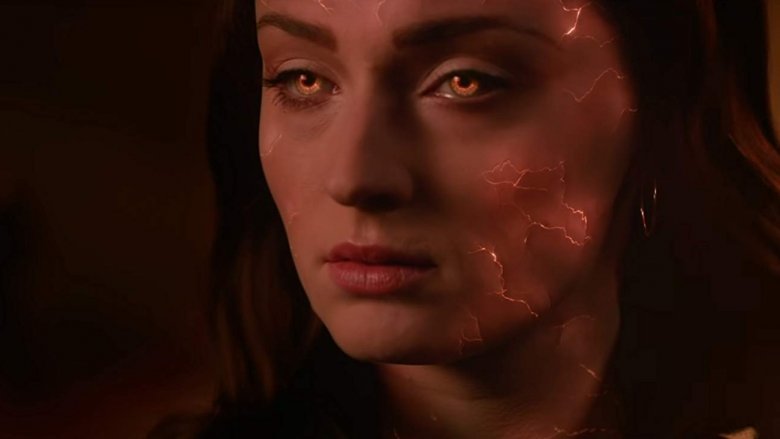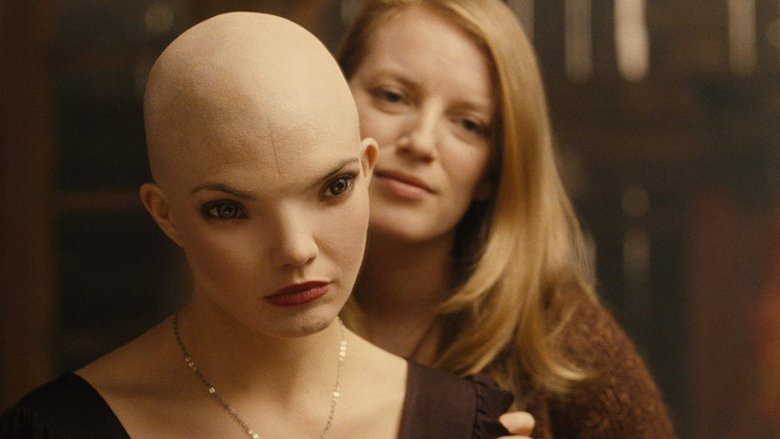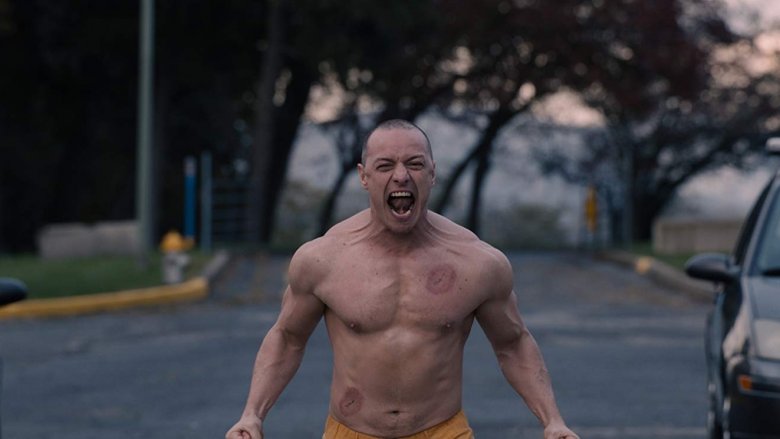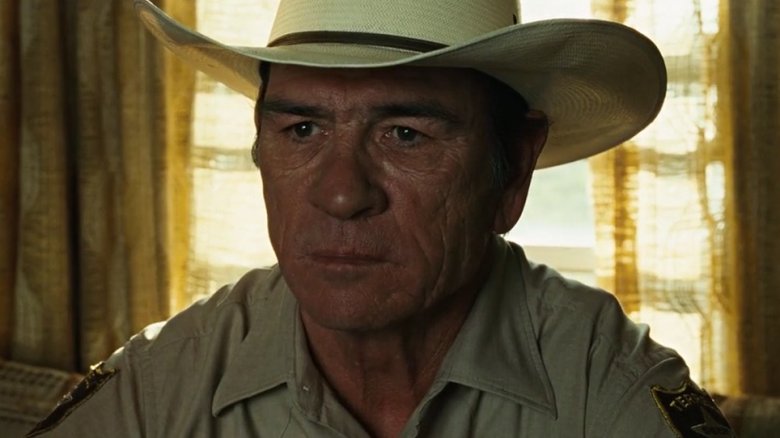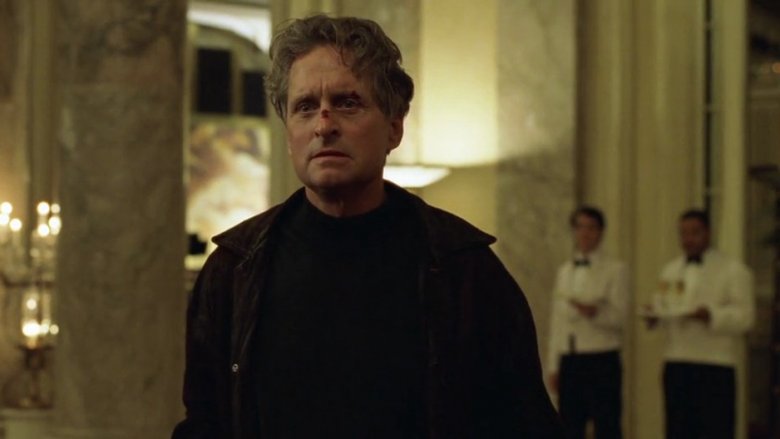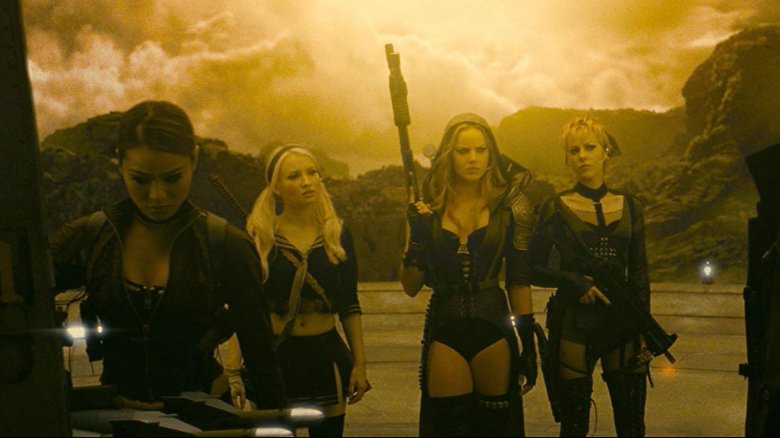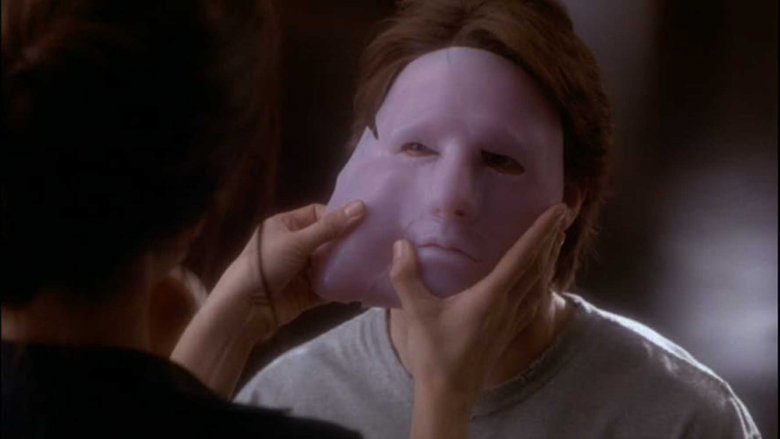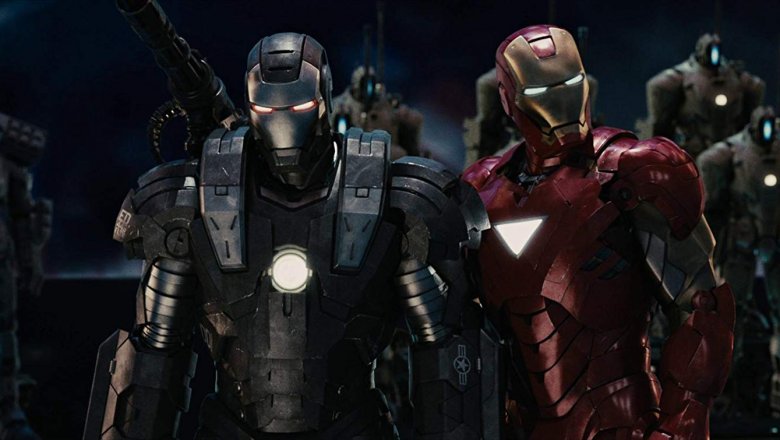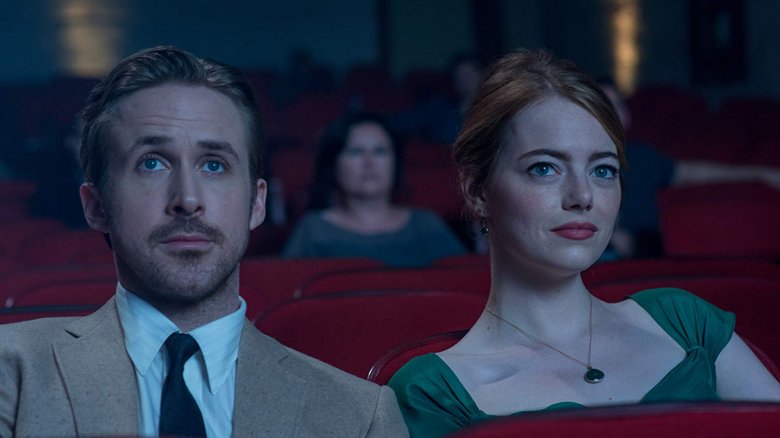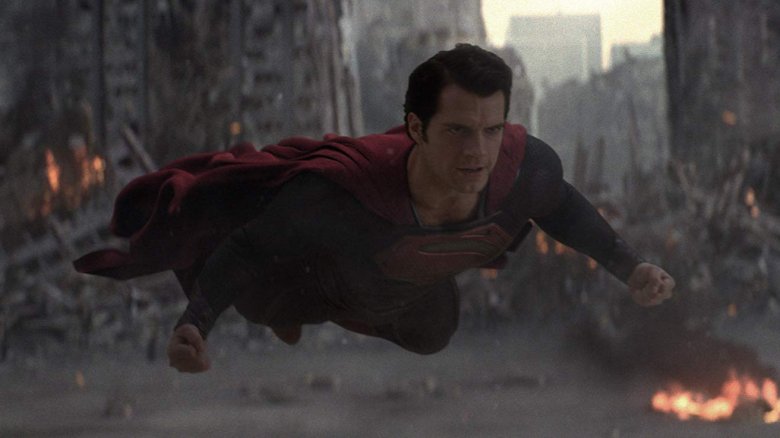The Most Unfulfilling Endings In Movies
The great joy of movies, when they work, is the sense that you're being carried away by the world that the film has created on the screen. An invisible, emotional link exists between viewer and filmmaker, and for a couple of hours you are held in that movie's embrace, ready to see the story through to the end. Then the end comes, and it's ... well, it's not what you thought it would be.
We've all felt that lack of fulfillment at the end of a long cinematic journey. Sometimes the endings try to spring a twist on you that just doesn't work, sometimes a film fizzles because it doesn't seem to know how to wrap things up, and sometimes the endings are just plain boring. Then, of course, there are those rare gems: Films that end in an unfulfilling way because that was the point, leaving you with a bittersweet feeling of contemplation as you drive home from the theater.
However they arrived there, here are some of the most unfulfilling movie endings of all time. And, of course, we are talking about the endings in detail here, so there are SPOILERS AHEAD for every film listed.
Planet of the Apes (2001) goes out with a "Huh?"
Tim Burton's remake of Planet of the Apes had quite a bit going for it, from its ensemble cast to the Rick Baker makeup effects, but when it came time to craft a new ending for the film, the filmmakers might have had better luck if they'd steered even further away from the Statue of Liberty ending made famous by the 1968 original.
In Burton's film, the human astronaut Leo Davidson uses the pod flown by the ape astronaut Pericles (long story) to leave the titular planet and return to Earth. When he arrives at what he thinks is his safe, familiar Earth, he looks up at the Lincoln Memorial and realizes Lincoln's head has been replaced by an ape's head, specifically that of ape General Thade.
A good, twisty cliffhanger is an asset to the right genre films, but it just doesn't work in this one. For one thing, it takes a minute for you to realize the memorial is supposed to be Thade, but for another, we're just not invested enough in the twist to care that it's happening. What's meant to be a thrilling stinger to make you eager for a sequel becomes a deflating "Huh?" moment instead.
The promise of the Dark Phoenix movie remains unfulfilled
The Dark Phoenix Saga is one of the most famous comic book stories of all time, and perhaps the most famous story in the history of the X-Men. Yet the second attempt at adapting it to the big screen managed to fizzle.
Dark Phoenix starts promisingly, with a mission to space and a mysterious force encountering Jean out in the void, then begins to build some interesting ideas through Jean's internal struggles and Charles Xavier's ongoing egotism. By the end, though, the film seems to devolve into a race to the finish just for the sake of getting it all over with. Charles and Jean reconcile because ... well, because the film seems to need them to. The X-Men fight the aliens who are after the Phoenix Force and Jean destroys them almost instantly, and then Jean flies away into the sky. Is she dead? Well, the film hints that she's not. Do we care? Not really. The last act of the film sucks all the narrative promise the story previously had out of the room, and Dark Phoenix ends with a whimper.
Hancock ends with a twist gone wrong
Plot twists and character unmaskings are hallmarks of superhero storytelling for a reason. In the right hands, they raise the stakes, change the game, and give the viewer another reason to be invested in characters they already deeply care about. The reveal in Spider-Man: Homecoming is one great example of this; it propels the film to another level of investment right as the third act is kicking off.
Then there are films like Hancock, which used its big character reveal in the hope of pulling off a similar shift to a higher gear, only to fizzle. The film has a promising premise — the titular superhero is kind of a jerk, and needs a little help to rehabilitate his image and attitude — but then comes the reveal that Hancock is actually an immortal and that his new friend's wife is also an immortal who knew him in the past and has just been biding her time until she can reveal herself to him again. In another scenario, it might work, but here it feels like too much. The emotional thread of the movie is cut just when it ought to be tightening.
Splice is unfulfilling because it's overwhelming
Splice is a film packed with potential energy, and it just keeps building and building it for much of its runtime. The story of a pair of scientists who secretly develop a human-animal hybrid creature and have to reckon with its increasingly violent tendencies, the film has a lot of interesting moving parts. It ranges from creepy sci-fi thrills to the kind of Promethean metaphors pioneered by stories like Frankenstein. It's intriguing, even gripping. And then the film's third act just kind of streamrolls right through it all.
Splice doesn't seem to know exactly what to do with all the big ideas and potential energy it's built up over its first and seconds acts, so by the end it just descends into chaos, throwing in everything from the creature having sex with one of the scientists as a female to the creature switching genders and straight-up raping its female creator and surrogate mother. Then, to top it all off, that rape scene results in a pregnancy. It's a lot to take in, and by the time it's over, it's hard to feel anything but overloaded and a little defeated.
Glass shatters on the landing
When M. Night Shyamalan revealed at the end of Split that the film was set in the same universe as Unbreakable, then teased a sequel that would unite the two stories, fans couldn't wait to see how the filmmaker would bring it all together. The film Shyamalan ultimately produced, Glass, is full of intriguing ideas, but by the end, it's managed to take the air out of both Split's creepy thrills and Unbreakable's superhero pontifications.
Things start to go downhill when it becomes clear that, in the midst of a final fight scene that was supposed to include an attack on a skyscraper, Shyamalan is actually out to kill his three main characters. When he does this, including dispatching Unbreakable's David Dunn so casually you almost forget he's important, it's all in service of not one, but two big twists. The first twist is the reveal that there's a secret society devoted to the termination of all superbeings before they get out of control. The second is that Mr. Glass actually filmed the entire confrontation and has released it online, revealing the existence of superheroes to the world. The problem is that by the time the last twist hits, you're still so detached from the first twist that it's hard to get excited.
No Country for Old Men has no ending for shallow thinkers
No Country for Old Men is, in terms of plot alone, the story of a man on the run after discovering a briefcase full of money, and the nearly supernatural killer tasked with chasing him down. The propulsive nature of that story, and the terror invoked by Javier Bardem's performance as Anton Chigurh, is enough to make it a great thriller for much of its runtime. There's something else at work throughout the entire film, though, and that really comes home to roost in the final minutes of the movie.
The man who found the money, Llewelyn Moss, doesn't win against the cartels who want their cash back. He dies, and his wife ultimately dies after him as Chigurh ties up loose ends before he himself manages to escape justice of any kind by walking away from a car accident. The film ends with retired Sheriff Ed Tom Bell reflecting on the case, and his life, through telling his wife about a dream he just had about his late father. There are no clean solutions, no pretty bows to tie it all up. It's all very unfulfilling, but in this case that is exactly the point. Sometimes the world doesn't make sense, and it's like life is telling you to move on. With this ending, the Coen Brothers captured that feeling perfectly.
The Game is so unfulfilling that it become fulfilling
David Fincher is a master of constructing elaborate, precise thrillers, and The Game is one of the earliest examples of his unique talents. It's the story of a wealthy man named Nicholas van Orton, whose estranged brother gives him a bizarre gift for his 48th birthday: A certificate that allows him to apply for an elaborate game that his rich friends seem to enjoy. After he's seemingly rejected from the game, someone starts to toy with him, and the game he's now an unwilling participate in turns deadly.
The twist? It was all part of the game all along. No one died, his life was not ruined by an unseen conspirator, and it was all orchestrated by his brother as an elaborate birthday present. In this way, The Game fits into the subgenre of thrillers featuring "it was all a dream/fantasy sequence/prank" endings, and that's always tricky.
Is The Game's ending unfulfilling? Yes, but the way in which it arrives there is so cleverly orchestrated that the lack of fulfillment works. Fincher puts the whole thing together so well that by the time it's all over, our lack of fulfillment actually eats at us as we leave the theater, and we wonder why we wanted so badly for things to end in actual violence instead of reconciliation. In that way, the ending is actually brilliant.
Sucker Punch never connects
Zack Snyder's Sucker Punch is a film in which the plot often feels like nothing more than a framework on which to hang a number of visually dazzling action sequences. And that's honestly fine for much of the runtime, because the action sequences can be rather captivating when they're at their best. The problem comes when all of this has to arrive at some kind of resolution, and that's when the worlds within worlds structure of the film starts to fall apart.
The "real world" of the film is an asylum, which the protagonist escapes by imagining a fantasy world that's a brothel, which then leads into another fantasy world where the action sequences take place. The film wraps up by bringing us back to the asylum, revealing that the villainous orderly has been caught and revealing that any "escape" the girls had planned might have all been in their heads all along. These convolutions are supposed to be thought-provoking, but by the time the dust has settled they become almost shrug-worthy.
Vanilla Sky takes too many turns
Vanilla Sky is a film that plays with the nature of memory, dreams, and the subconscious in the hope of telling us the story of a man who learns something about himself via a journey through his own mind. It's an idea that a lot of films have played with, and it allows for plenty of interesting twists and turns in the narrative. But in this case, Cameron Crowe's journey into a man's lucid dream falls short.
For a while, the film seems to be the journey of a damaged man, Tom Cruise's David, trying to find his way to acceptance. Then it becomes an almost paranoid thriller as David tries to reconcile reality with the visions he's having. Then it becomes a science-fiction film in which we learn that David has been in a cryogenic state with his mind living in a lucid dream for decades. It's a lot to take in, and while writer/director Cameron Crowe certainly embraces the cleverness of the plot, the emotional connections we're supposed to feel are severed. The result is an admirably intricate movie that nevertheless can't stick its landing.
Iron Man 2 gives the MCU its worst ending
The films of the Marvel Cinematic Universe have been labeled a bit too formulaic in the past, and it's true that they often stick to a predictable framework that culminates in a large battle which the hero ultimately wins, followed by a little wrap-up that shows us what the title character (or characters) learned along the way. The thing is, that formula exists because more often than not it works, at least in the MCU's case. Then there are films like Iron Man 2.
There's a lot of promise in the film, which follows Tony Stark as he grapples with his newfound superhero fame while dealing with the new threat of Whiplash and the possibility of Nick Fury recruiting him into the Avenger Initiative. There are also a lot of cool sequences, including a battle on a racetrack. But then we reach the finish line, and Tony Stark and his pal Rhodey are fighting ... a bunch of drones who look exactly like them. And then Whiplash is in another big suit of armor. It's a bland way to close things out, and it all happens so fast that you barely feel any sense of the stakes. Throw in the fact that Fury then tells Tony he's not going to be recruited for the Avenger Initiative (even though we already know he is), and you get an ending that's just a big shrug.
La La Land is as unfulfilling as real life
La La Land is, for much of its runtime, a bright, exciting, and lavishly choreographed love letter to show business, charting the song-and-dance love story of aspiring actress Mia and jazz musician Sebastian. Then, things take a turn, as the film shows us a portrait of a relationship crumbling as Mia and Seb's respective career ambitions start to pull them apart.
Things go from sweet, to bittersweet, and then to heartwrenching as the film jumps forward five years to show us one last encounter between Mia and Seb. Mia, now a successful actress with a husband and a daughter, shows up at Seb's new jazz club. They've both fulfilled their dreams, but as he plays with her in the audience, they also share a vision of what might have been, and the love they could have had together if they'd found a way to work it out. It's an emotional gut punch and a deliberately unfulfilling portrait of what might have been, and it works exactly the way it's supposed to.
Man of Steel
Zack Snyder's Man of Steel features one of the most divisive final acts in the history of superhero cinema, culminating in the now-infamous moment when Superman snaps General Zod's neck. Fans debated the scene for weeks after the film's release, and even now the arguments are reignited over and over again online.
We're not here to debate the merits of the moment itself, though. We're here to talk about the ending of the film, and whether or not it reached any kind of satisfying conclusion in the wake of Superman's reluctant murder of his fellow Kryptonian.
In Man of Steel, Superman mourns Zod's death for all of five seconds before a happy reunion with Lois Lane, and then the film wraps things up by attempting to establish the dual lives of Superman and Clark Kent. It does this by having Superman destroy a military drone in an effort to maintain some kind of independence from the U.S. Armed Forces, and by having Clark Kent get a reporting job at the Daily Planet. Neither moment feels earned, and neither moment carries any kind of emotional weight after the events of the rest of the film. Even though we knew a sequel was coming, this felt like an underwhelming way to leave things.
